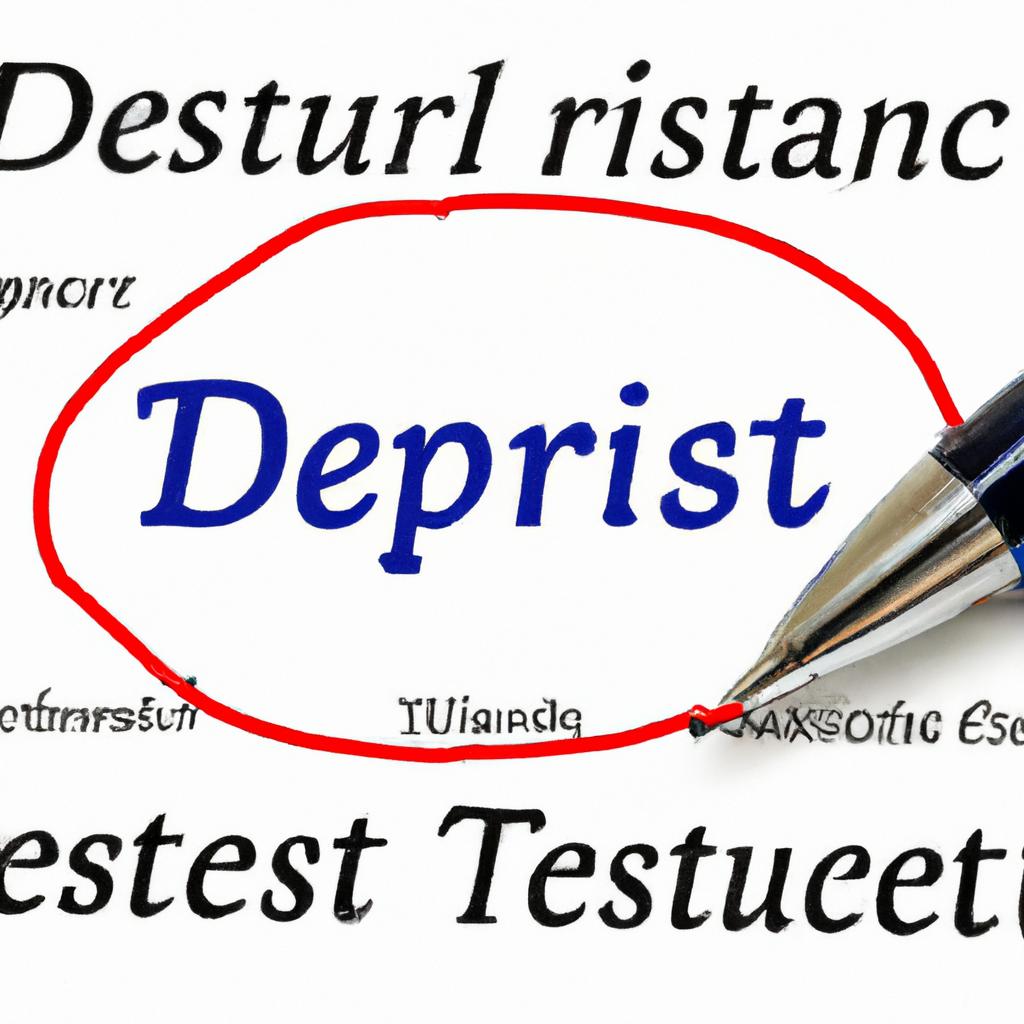In the intricate web of real estate transactions, the terms ”deed of trust” and “title” are often used interchangeably, leading to confusion and misinformation. As seasoned legal experts at Morgan Legal Group in the bustling heart of New York City, we strive to unravel the mystery surrounding these crucial documents. In this article, we will explore the nuanced differences between a deed of trust and a title, shedding light on their distinct roles and significance in property ownership. Join us on a journey through the complex world of real estate law, as we delve into the intricacies of these fundamental concepts.
Understanding the Difference Between Deed of Trust and Title
When discussing real estate transactions, it is crucial to understand the distinction between a deed of trust and title. While both are essential components of property ownership, they serve different purposes and confer different rights to the parties involved.
A deed of trust is a legal document that outlines the terms of a loan secured by real property. It involves three parties: the borrower (trustor), the lender (beneficiary), and the trustee. The trustee holds legal title to the property until the loan is paid off, at which point the trustee conveys the title to the borrower. On the other hand, title refers to the legal ownership or interest in a property, which can be held by an individual or entity. It establishes the rights and responsibilities of the owner, including the right to possess, use, and transfer the property.

Key Distinctions and Legal Implications of Deed of Trust versus Title
When it comes to real estate transactions, understanding the differences between a deed of trust and title is crucial. While both documents involve property ownership, they serve distinct purposes and have different legal implications.
Key distinctions between a deed of trust and title:
- A deed of trust is a legal document that gives a lender a security interest in the property as collateral for a loan, while title refers to the legal ownership rights to a property.
- In a deed of trust, there are three parties involved - the borrower (trustor), the lender (beneficiary), and the trustee who holds legal title to the property until the loan is paid off. In contrast, title simply denotes who has legal ownership of the property.

Importance of Clarity and Precision in Property Ownership Documentation
When it comes to property ownership documentation, clarity and precision are crucial factors that cannot be overlooked. The deed of trust and title are two distinct legal documents that are often confused by individuals entering into property transactions. It is essential to understand the key differences between the two to ensure that your rights and interests are properly protected.
**Deed of Trust:**
- Specifies the terms of a loan secured by real property
- Transfers legal title to a trustee as security
- Allows the trustee to sell the property if the borrower defaults on the loan
**Title:**
- Proof of ownership of a property
- Identifies the legal owner of the property
- Contains information about any liens, easements, or encumbrances on the property
In summary, while a deed of trust is related to a mortgage loan, the title is a document that establishes ownership rights of a property. It is important to have clear and precise documentation of both to avoid any confusion or legal disputes in the future.

Seeking Professional Guidance for Deed of Trust and Title Matters
When it comes to navigating the complexities of deed of trust and title matters, seeking professional guidance is essential to ensure that your interests are protected. Many individuals often wonder if a deed of trust is the same as a title, but the two are distinct legal concepts that serve different purposes.
A deed of trust is a legal document that transfers the legal title of a property to a trustee as security for a loan between a borrower and a lender, while a title refers to the legal ownership of the property. Understanding the nuances of these legal documents is crucial in real estate transactions to avoid potential legal disputes in the future. At Morgan Legal Group, our team of experienced attorneys can provide you with the knowledgeable guidance you need to navigate deed of trust and title matters with confidence.
Q&A
Q: Is a deed of trust the same as a title?
A: While they both play a role in property ownership, a deed of trust and title are not the same. A deed of trust is a legal document that gives a lender an interest in the property as security for a loan, while a title is a legal document that establishes ownership of the property.
Final Thoughts
In conclusion, while the deed of trust and title are both important documents in the property ownership process, they serve different purposes. The deed of trust secures the loan on the property, while the title proves ownership. Understanding the distinction between the two can help streamline the homebuying process and ensure a smooth transaction. So next time you’re navigating the world of real estate, remember that the deed of trust and title may be related, but they are not one and the same. Happy homebuying!
 Title: Is Deed of Trust the Same as Title? A Comprehensive Guide
Title: Is Deed of Trust the Same as Title? A Comprehensive Guide
Introduction:
If you’re in the process of buying or selling a property, you may come across terms such as “deed of trust” and “title.” These are important legal documents involved in real estate transactions, but are they the same thing? In this comprehensive guide, we will explore the differences and similarities between deed of trust and title, and why it’s crucial to understand these terms to protect your interests in a property.
Key Terms:
– Deed of Trust
– Title
– Trustor
– Trustee
– Beneficiary
– Lien
– Foreclosure
What is Deed of Trust?
A deed of trust is a legal document that serves as a security for a loan or mortgage on a property. It involves three parties: the trustor (borrower), the trustee (a third-party representative), and the beneficiary (lender). The trustor transfers the title of the property to the trustee, who holds it as security for the loan. Once the loan is paid in full, the trustee transfers the title back to the trustor.
The deed of trust outlines the rights and responsibilities of all parties involved in the transaction, including the conditions and terms of the loan, payment schedule, and consequences of defaulting on the loan. It is recorded with the county recorder’s office, making it a public record and ensuring the lender’s interest in the property.
What is Title?
Title refers to legal ownership of a property. An individual or entity holds the title of the property as a sign of their right to possess, use, and transfer it. When purchasing a property, the title needs to be cleared to ensure that there are no claims or liens against it. A clear title gives the buyer full ownership and protects them from any future claims on the property.
A title search is often conducted during a real estate transaction to uncover any issues or discrepancies that may affect the ownership rights of the property. This search involves reviewing public records such as deeds, mortgages, wills, and court documents to verify the current owner and uncover any defects in the title.
Differences Between Deed of Trust and Title:
Deed of trust and title are two separate legal documents, but they are closely related. The main differences between the two are as follows:
– Parties involved: A deed of trust involves three parties, while title is between the current owner and the buyer.
– Purpose: A deed of trust is used to secure a loan, while a title is used to prove ownership.
– Recording: A deed of trust is recorded with the county recorder’s office, making it a public record. A title is not automatically recorded but can be if the buyer wants to protect their interest in the property.
– Transfer of ownership: With a deed of trust, ownership is temporarily transferred to the trustee, while with a title, ownership is permanently transferred to the buyer.
– Foreclosure process: In case of default, a trustee can initiate a non-judicial foreclosure process based on the terms outlined in the deed of trust. In contrast, a lender with a clear title must go through the court to foreclose a property.
Why Understanding These Terms is Important:
Understanding the differences between deed of trust and title is crucial for anyone buying or selling a property. Ignorance or misunderstanding of these terms can lead to potential legal and financial issues. Here’s why:
– Protect your rights: When purchasing a property, it’s crucial to have a clear title to ensure you have full ownership and rights to use and transfer the property without any legal repercussions. Failing to do a title search can leave you vulnerable to potential claims or liens on the property.
– Avoid foreclosure: As a borrower, understanding the terms outlined in the deed of trust can help you avoid defaulting on your loan and facing foreclosure. It’s important to know the consequences of failing to make payments and what steps the trustee can take to recover the property.
– Negotiate terms: As a buyer, understanding the terms of the deed of trust can help you negotiate better loan terms with the lender. You can also request changes to the deed of trust that could benefit both parties.
– Legal protection: Both the deed of trust and title are legally binding documents that protect the interests of all parties involved in the real estate transaction. Understanding these documents can help you make informed decisions and protect your rights as a buyer or seller.
Conclusion:
In conclusion, while deed of trust and title are both important legal documents, they serve different purposes and involve different parties. A deed of trust secures a loan, while a title proves ownership of the property. As a buyer or seller, it’s crucial to understand the terms and implications of these documents to protect your interests in a real estate transaction. Consider consulting a legal professional for further clarification and guidance regarding these documents.

